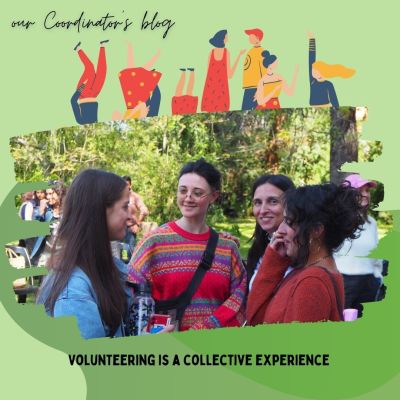By Max Brenssell
The popularity of volunteering Nowadays, there are many explanations as to why volunteering is so popular. One important aspect is the role of the media. In today’s globalised World, it is very easy to obtain lots of information. For example, we read daily of the poverty in South America, famine in Africa or war in the Middle East. This rising social awareness results in the readers’ urge to try their hand and reform. But volunteering may not only be motivated by altruism, its advantages are multifaceted. Doing volunteer work has, for example, become an important election criteria for universities and is generally considered helpful to improve your CV. Also, as for the majority of university courses you will have to complete an internship, many students consider applying in NGOs. Jeremy, for example, a student from Paris who is currently volunteering at VG, says that he enjoys diversifying his compulsory internship by simultaneously helping other people. A further reason for the popularity of volunteering could be the rising youth unemployment in developed countries. Due to the recession and economic decline in many countries around the world, many young and motivated people are unable to find a job. Therefore, the young population has the enticing possibility of volunteering at their fingertips. 70% of volunteers are female
According to a recent data gathered by Voluntario Global, it is possible to confirm the long-term persistence of this trend. In 2011, 72% of volunteers were female and in 2012, 84% of the volunteer applicants were female. Approximately 70% of volunteering women are between 18 and 25 years of age, indicating that they have recently, or almost, completed their academic education and are likely to be unemployed, or generally uncommitted. Is volunteering a female activity? But why do women seem to prefer volunteering? Again, there are various possible reasons. Do women generally have more spare time than men? In Western societies, unemployment among women is not usually higher than among men. The only exception is in Arab states, where on average only 28% of the workforce is female. This means indicating that women do not generally have more spare time. Is it possible that women prefer it because they have a greater sensibility towards the needs of others? From a historical point of view, it is possible to argue that, in most societies, women have had the task to raise and care for the children. Therefore one could conclude that women have more of a natural tendency towards helping others than men do.
Furthermore, education has only in recent years been standardized for boys and girls. In systems that offer gender-specific education, girls may still be taught more towards working in the service sector. This consequently affects the employment in the educational sector, resulting in the majority of employees being female. This is especially true for nursery and primary schools, or more generally jobs involving the supervision of very young children. In this period of early childhood we absorb all impressions we receive from our environment, as our personality just starts developing. Thus, it can be argued that at an early age we already learn to recognize helping others as a female attribute. Nevertheless, it is still difficult to pinpoint the reason why there are more female volunteers than men. Maybe this issue needs to be evaluated from a different point of view. Instead of asking why women seem to prefer volunteering, one might wonder why men seem to prefer not to volunteer. Once more, there is no simple answer to these questions on gender in the social structure of society.
However, an important aspect might be the conservatism of our societies. Argentina, for example, is frequently described as a “macho-society”, but this expression can equally be applied to many other countries. According to volunteers interviewed, men will usually be expected to work and provide for their family in their home country. This may put pressure on young men to start a career rapidly, so as to begin earning money. This thesis is supported by the fact that almost 70% of volunteering women are between 18 and 25 years old, an age distinctive for laying the foundations of a successful career. Ironically, as previously mentioned, volunteering is likely to help you improve your CV, enter a good university and ultimately benefit your career. Overall, it is not possible to determine one specific reason for female predominance in volunteering. A symbiosis of human history, our education and the structure of our society all contribute to why the large majority of volunteers are women. Perhaps the final question is, why do so many men do not appreciate or recognize the long-term benefits and advantages they might receive from volunteering?





